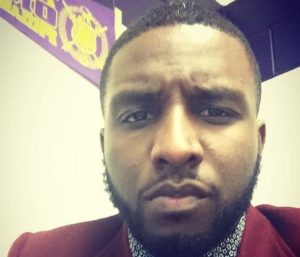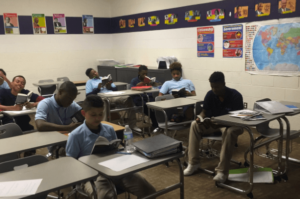
Kufere Laing (Courtesy Kufere Laing)
Kufere Laing teaches seventh and eighth grade students at Voyager Academy in Detroit. As a social studies instructor at the predominantly Black Michigan school, Laing found it challenging to educate his pupils on Black culture through photocopied textbooks.
So, he launched a successful $1,000 campaign on Donors Choose to provide students with several books to allow them to think about and discuss their character. Laing ultimately exceeded that aim, raising a total of $1,700.
The funds went towards the following books for his 25 students. The Autobiography of Malcolm X as told to Alex Haley, Things Fall Apart by Chinua Achebe, The Skin I’m In and You Don’t Even Know Me Stories and Poems About Boys by Sharon G. Flake, Monster and Slam! by Walter Dean Myers and A People’s History of the United States by Howard Zinn.
After reaching that goal within 24 hours, Laing told Atlanta Black Star it showed he was on the right track.
“It was just affirming,” he said. “I think it let me know that people believed in our children more than anything else.”
Much of the literature allows Laing’s students to build their identity, something that typical textbooks don’t provide.
“Often times, the information put in front of Black students isn’t at all relatable,” he stated. “With pre-teens, it’s important to have a lot of work around identity. Who you are in this world, how can we make sense of your experience?”
Most of the textbooks presented to Black youth ignores their existence and heavily relies on lessons on European history and colonization, he said.
“At no point in time are Black students given the opportunity to think about why and how do we exist in this world,” he said. “By not acknowledging Black students’ existence, the text in front of you is saying all these other things are worth noting. You, however, are not.”
Laing believes his experience as a Black man in America informs the way he teaches his class. A native of Pittsburgh, Pennsylvania’s historically Black neighborhood, the Hill District, and a member of Omega Psi Phi, Laing recognizes how much his culture influences his student-teacher interactions.

Kufere Laing’s middle school class at Voyager Academy in Detroit, Michigan (Courtesy Kufere Laing)
“I’m in a lot of different African-American communities,” he stated. “I can communicate with my students in a common language. And it’s not just the words that I’m using, but it’s also the rhythm that Black people speak in. Even my mannerisms are influenced by these Black experiences.”
Laing added that living as a Black man made him reflect on his unhappiness with the world, and he vowed that as a teacher he would find a way to change it.
The 23-year-old chose several books to educate his class about Black culture. After coming across A People’s History of the United States,by Howard Zinn, Laing knew he needed to find a way to make the high school and college material accessible to tweens.
“I was about to re-write the chapters,” he explained. “I was googling it [thinking], ‘I know there’s got to be a way where somebody had already did this. And so I found A Young People’s History of the United States.”
Laing said he bought the book and made photocopies weekly since his school did not have it in textbook form. He added the situation was helpful because of the typically oppressive narratives covered in school materials. For example, the instructor pointed out stories about enslavement that were touted as being necessary.
“I object to this,” Laing said of the traditional history lessons. “Who are you to tell me that the world I’m living in today is one I should be happy with? So A Young People’s History does a really good job of giving multiple perspectives.”
He noted the book allows students to learn the strategy behind why a historical event occurred. When it comes to Christopher Columbus’ colonization of the Caribbean, Laing explained the Italian explorer recognized the power of his weapons.
“The book allows for classroom dialogue that is very critical of our experience and doesn’t accept anything as ‘it just played out that way.’ No. The whole thing has been planned out since day one.”
In addition to the primary textbook, one novel – Monster – had a significant impact on Laing as a child.
While participating in an elementary school play, the Teach For America member would hide away in a coat closet backstage eagerly reading the 1999 novel.
“It totally captivated me and I remember how excited I was reading it. Walter Dean Myers is a superb author – especially for Black literature for pre-teens where there’s really not a lot of options.”
Monster centers on Steve Harmon, a Black teenager who is on trial for murder. During the case, the teen writes a screenplay. The book explores the treatment of African-Americans in the justice system and Steve’s fight for his humanity.
“Walter Dean Myers is such a great author that the kids don’t see all that happening,” Laing said. “They just see a compelling story. The entire book, as you’re reading it, it shows he’s not a monster.”
Laing aims to plant a seed to get students to think critically about their life experiences. He asks his students to reflect on how they relate to Monster and question why things happen in the plot.
In his lessons, the teacher said he wants students to know Blackness isn’t a negative aspect of their character.
“What I’m trying to make sure they never question is, ‘The fact that I’m Black isn’t a strike against me. The fact that I’m Black isn’t any indictment on who I am or my self-worth. And I deserve everything positive that this world has to offer because I’m a person. Despite the fact that we live in a white supremacist society that attempts in all aspects to argue that I’m less than a person.’ On that mission, I think, every day I see strides.”


